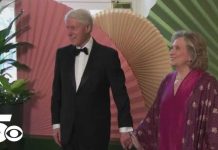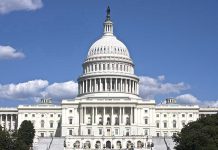
Donald Trump’s late-game endorsement of Winsome Earle-Sears in the Virginia governor’s race could turn a historic election into a defining moment for national politics—if voters decide his support is a blessing, a curse, or a curveball no one saw coming.
Story Snapshot
- Trump’s endorsement of Earle-Sears arrives as early voting is underway and polls show a significant Democratic lead.
- Virginia’s 2025 election is the first in state history with both major parties fielding female nominees for governor.
- The outcome will measure Trump’s lingering influence in a state that trended blue in the last presidential contest.
- Winsome Earle-Sears aims to become the first Jamaican-born female governor in American history.
Trump’s Surprise Move Shakes Up a Historic Race
With the clang of campaign season in full swing, Donald Trump’s endorsement of Winsome Earle-Sears landed like a jolt in Virginia’s already electrified gubernatorial race. The timing is critical: early in-person voting began September 19, and both parties are fighting for every last undecided. Trump’s decision injects fresh uncertainty into a contest already historic for its all-female slate—Earle-Sears, a Republican and the state’s lieutenant governor, faces off against Abigail Spanberger, a former CIA officer and Democratic congresswoman. Trump’s support for Earle-Sears is not just about Virginia; it is a test of whether his brand can still mobilize Republican enthusiasm in a state that backed Kamala Harris just a year prior.
Polling data released just days before Trump weighed in paints a daunting picture for Earle-Sears: Spanberger leads by double digits, buoyed by independents and younger voters. The Republican campaign, once hoping to capitalize on Virginia’s tradition of electing governors from the party opposite the president, now faces a landscape more polarized than ever. Trump’s endorsement is pitched as a rallying cry, intended to energize the conservative base and—just maybe—shift the momentum in Earle-Sears’ favor. Yet the question remains: does Trump’s backing ignite a late surge, or does it reinforce Democratic turnout wary of his return to the spotlight?
Virginia’s Political Traditions Clash with Modern Realities
Every four years, Virginia’s off-year gubernatorial race reads like a bellwether for national sentiment. Historically, voters have chosen a governor from the party not holding the White House—except for a solitary exception in 2013. In 2025, the tradition faces new pressures. The state’s political demographics have shifted left in recent federal elections, with Democrats finding growing purchase in the suburbs and among younger, more diverse voters. Yet the Republican base remains loyal, particularly in rural and exurban enclaves. Earle-Sears, as the state’s first Black female lieutenant governor, has a compelling narrative and a record tied closely to Glenn Youngkin’s policy successes. Spanberger, meanwhile, brands herself as a pragmatic moderate, touting her national security credentials and bipartisan legislative wins.
Trump’s last-minute move is calculated. He seeks to demonstrate continued sway over the GOP and perhaps prove Virginia can still swing red under the right conditions. For Earle-Sears, his support could mean an influx of campaign energy, volunteers, and national attention. For Spanberger, the Trump factor is a gift—an opportunity to cast her opponent as out of step with Virginia’s changing electorate. Both sides know: the governor’s mansion could set the tone for 2026 and beyond.
Implications for Virginia and the Nation
The stakes reach far beyond Richmond. If Earle-Sears can close the polling gap and win, she would make history as the first Jamaican-born female governor in the United States—and provide Republicans with a roadmap for victory in states trending blue. Her campaign promises a focus on economic growth, education reform, and public safety, echoing core conservative themes. Spanberger, if victorious, would continue the Democratic momentum that has delivered recent statehouse and congressional gains. Her agenda emphasizes healthcare access, bipartisan pragmatism, and a steady hand in turbulent times.
Short-term, the result will be dissected for clues about Trump’s influence and the health of both parties heading into the next presidential cycle. Long-term, the election’s outcome could reshape policy on business, taxation, and social issues for millions of Virginians. The symbolism of two women vying for the state’s highest office also signals a lasting shift in gender representation—regardless of the final tally. For voters, the decision transcends personalities and party lines; it is a referendum on where Virginia fits in the evolving American political landscape.
Sources:
Wikipedia: 2025 Virginia gubernatorial election
Virginia Department of Elections: Upcoming Elections
Virginia Election 2025 Guide: Candidates, Deadlines, and Ballot Basics
Emerson College Polling: Virginia 2025 Polling


















